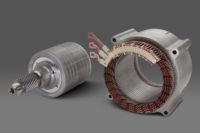Teams from the University of Alabama, Clemson University, the University of Michigan (Dearborn campus) and Ohio State University are engaging in a head-to-head competition. But, it has nothing to do with football. The battle is all about batteries.
The U.S. Department of Energy's Battery Workforce Challenge is focusing on developing a diverse, highly skilled pool of talent to help the United States transition to electric mobility and clean energy. Cosponsors are the U.S. Department of Energy and Stellantis. AVL, Dana Corp., MathWorks and Our Next Energy are also involved.
The BattChallenge tasks 12 universities, along with their vocational school partners, to design, build, test and integrate an advanced lithium-ion battery into a Ram ProMaster electric van.
In addition to 10 teams from U.S. schools, there are two Canadian teams participating. And, to enable students from diverse socio-economic backgrounds to participate, four of the 12 universities selected are minority-serving institutions, including a historically Black college (Jackson State University).
The competition wraps up in 2026 with the winning teams receiving annual engineering and sponsor-related category awards, $100,000 in industry-provided prize money, and invaluable employment, collaboration and networking opportunities. The final event will take place at the Stellantis proving ground in Chelsea, MI, or Yucca, AZ.
Throughout the three-year competition, the collegiate teams will follow industry design and development processes focused on controls development, safety, simulation, testing, and vehicle integration and demonstration. Along the way, the students will design a custom battery pack using commercial 2170 cylindrical cells and complete a professional design review with subject matter experts. They will characterize the cells to understand voltages and temperatures from different applied current profiles.
Each team will design battery management systems, mechanical and thermal components, wiring harnesses, and software for monitoring and control. This hands-on experience will include functions such as battery pack enclosures, cell balancing, power busing and interfacing, structural integrity and thermal management.
Engineers from Argonne and the other sponsors will provide in-depth training and guidance from industry experts to ensure students have the tools to succeed at the objectives of the competition. Students will learn valuable skills and gain unparalleled educational experience that will ready them for future careers throughout the battery industry.
“Initiatives like the Battery Workforce Challenge stem from a compelling need for heightened American ingenuity and an increased workforce in the EV sector,” says Michael Berube, deputy assistant secretary for sustainable transportation and fuels in the Office of Energy Efficiency and Renewable Energy at the U.S. Department of Energy. “This competition will immerse students in hands-on, real-world experiences crucial to building skills needed to support a cleaner, more sustainable energy economy.
“American leadership in the global battery supply chain will be based not only on our innovation, but also on our skilled workforce of engineers, designers, scientists, production workers and technicians,” adds Berube. “This comprehensive workforce program will build an educational ecosystem delivering training and education for high school graduates and vocational and transitional workers, fostering a diverse talent pipeline of trained engineers, workers and technicians who can charge North America’s battery industry forward.”
Each year, student will participate in fall and spring workshops, plus a year-end meeting. The first five-day event will be held May 5-9 in Chicago. Students will present interactive displays and will discuss their work with a panel of industry and government judges. Each of the various categories will have multiple awards.
Last October, teams attended an inaugural three-day workshop in Alexandria, VA. Educational sessions included topics such as algorithms and simulations, battery controller area network interface, battery disconnect unit function and components, battery sizing and design, electrochemistry and cell design, and high-voltage systems.
“Students don’t usually get these kind of opportunities to travel and network with actual large companies like Stellantis,” says David Robertson, BattChallenge principal battery engineer and organizer. “This really did provide them a unique experience.
“Some of them were coming up to me and saying, ‘This is amazing! We never get to do anything like this,’” claims Robertson. “So I think they recognize that the amount of information that was provided to them, the resources that they are getting are not something that many schools can provide.”
Robertson sees invaluable opportunities like these leaving a lasting impact, inspiring the students long after the competition is complete.
“Adding the Battery Workforce Challenge to your resume, and potentially the internships that are being offered across our sponsors, can definitely boost that resume to stand out by the time they graduate,” explains Robertson. “That really does speak to real-life experience and to real problem solving that you don’t really get that much of in a classroom setting.”
“This is the 14th vehicle-related competition that we’ve hosted since 1988,” adds Austin Brown, Ph.D., vehicle technologies office director at the U.S. Department of Energy. “For instance, since 2008, we’ve hosted the EcoCAR Challenge, which has become increasingly focused on electric vehicles. In fact, there’s a concurrent EcoCAR EV Challenge going on.
“In the past, many automotive companies have hired students who participated in similar competitions,” says Brown. “So, we think the BattChallenge can provide a launching point to an excellent career.”
General Motors provided each of the 13 collegiate teams competing in the EcoCAR EV Challenges with a 2023 Cadillac Lyriq. Students will demonstrate the potential of advanced propulsion systems, connected and automated vehicle technologies, and other innovative technologies to analyze energy efficiency. Alabama and Ohio State are participating in both the BattChallenge and the EcoCAR EV Challenge, along with McMaster University and the University of Waterloo.






